| Srl | Item |
| 1 |
ID:
067054
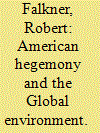

|
|
|
| 2 |
ID:
112802
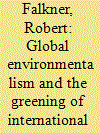

|
|
|
|
|
| Publication |
2012.
|
| Summary/Abstract |
Have environmental values become part of the normative structure of international society? Has the rise of global environmentalism led to a greening of international society? Most International Relations research on environmental issues fails to address these questions as it typically focuses on the creation of issue-specific regimes or informal governance mechanisms. This article engages English School theory in an effort to examine the impact that global environmentalism has had on the social structure of International Relations. It argues that a primary institution of global environmental responsibility is emerging, and explores the relationship and tensions between environmental responsibility and the established primary institutions of sovereignty, international law and the market.
|
|
|
|
|
|
|
|
|
|
|
|
|
|
|
|
| 3 |
ID:
076348
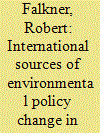

|
|
|
|
|
| Publication |
2006.
|
| Summary/Abstract |
China's agricultural biotechnology policy has undergone a profound transformation over the last decade, from a strongly promotional to a more precautionary approach. From the 1980s onwards, China invested heavily in biotechnology development and in the early 1990s emerged as the leading biotech country in the developing world. In the late 1990s, however, it halted the authorization of new genetically modified crops and introduced stringent safety regulations. This paper investigates this policy shift and argues that international factors have played a central role. Two trends, in particular, are identified as key sources of the move towards greater precaution: China's ongoing international socialization, particularly in the context of the international scientific debate on biosafety and the negotiations on a biosafety treaty; and the growing globalization of agriculture and trade, which has exposed China to international competitive forces and trade restrictions in food trade. As the case of genetically modified food in China shows, political integration and economic globalization can work together to promote a strengthening of the domestic environmental policy agenda.
|
|
|
|
|
|
|
|
|
|
|
|
|
|
|
|
| 4 |
ID:
145079
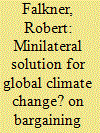

|
|
|
|
|
| Summary/Abstract |
Gridlock in the multilateral climate negotiations has created growing scholarly and practical interest in the use of minilateral forums. A large variety of climate club proposals have been developed in recent years, which promise more effective bargaining among the main climate powers, better incentives to encourage mitigation efforts and discourage free-riding, and new ways to align international power asymmetries with the interests of the global climate regime. I investigate the three dominant rationales that underpin minilateralist proposals. I offer a critical review of their potential as well as their limitations in promoting global climate action. I argue that minilateralism is unlikely to overcome the structural barriers to a comprehensive and ambitious international climate agreement. However, climate clubs can enhance political dialogue in the context of multilateral negotiations and can provide a more conducive environment for great power bargaining. They can create club benefits that strengthen mitigation strategies and help reduce the dangers of free-riding for so-called coalitions of the willing. And they can help re-legitimate the global climate regime against the background of profound power shifts that have slowed down progress in the multilateral negotiations.
|
|
|
|
|
|
|
|
|
|
|
|
|
|
|
|
| 5 |
ID:
148456
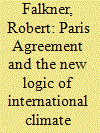

|
|
|
|
|
| Summary/Abstract |
This article reviews and assesses the outcome of the 21st Conference of the Parties (COP-21) to the United Nations Framework Convention on Climate Change (UNFCCC), held in Paris in December 2015. It argues that the Paris Agreement breaks new ground in international climate policy, by acknowledging the primacy of domestic politics in climate change and allowing countries to set their own level of ambition for climate change mitigation. It creates a framework for making voluntary pledges that can be compared and reviewed internationally, in the hope that global ambition can be increased through a process of ‘naming and shaming’. By sidestepping distributional conflicts, the Paris Agreement manages to remove one of the biggest barriers to international climate cooperation. It recognizes that none of the major powers can be forced into drastic emissions cuts. However, instead of leaving mitigation efforts to an entirely bottom-up logic, it embeds country pledges in an international system of climate accountability and a ‘ratchet mechanism’, thus offering the chance of more durable international cooperation. At the same time, it is far from clear whether the treaty can actually deliver on the urgent need to de-carbonize the global economy. The past record of climate policies suggests that governments have a tendency to express lofty aspirations but avoid tough decisions. For the Paris Agreement to make a difference, the new logic of ‘pledge and review’ will need to mobilize international and domestic pressure and generate political momentum behind more substantial climate policies worldwide. It matters, therefore, whether the Paris Agreement's new approach can be made to work.
|
|
|
|
|
|
|
|
|
|
|
|
|
|
|
|